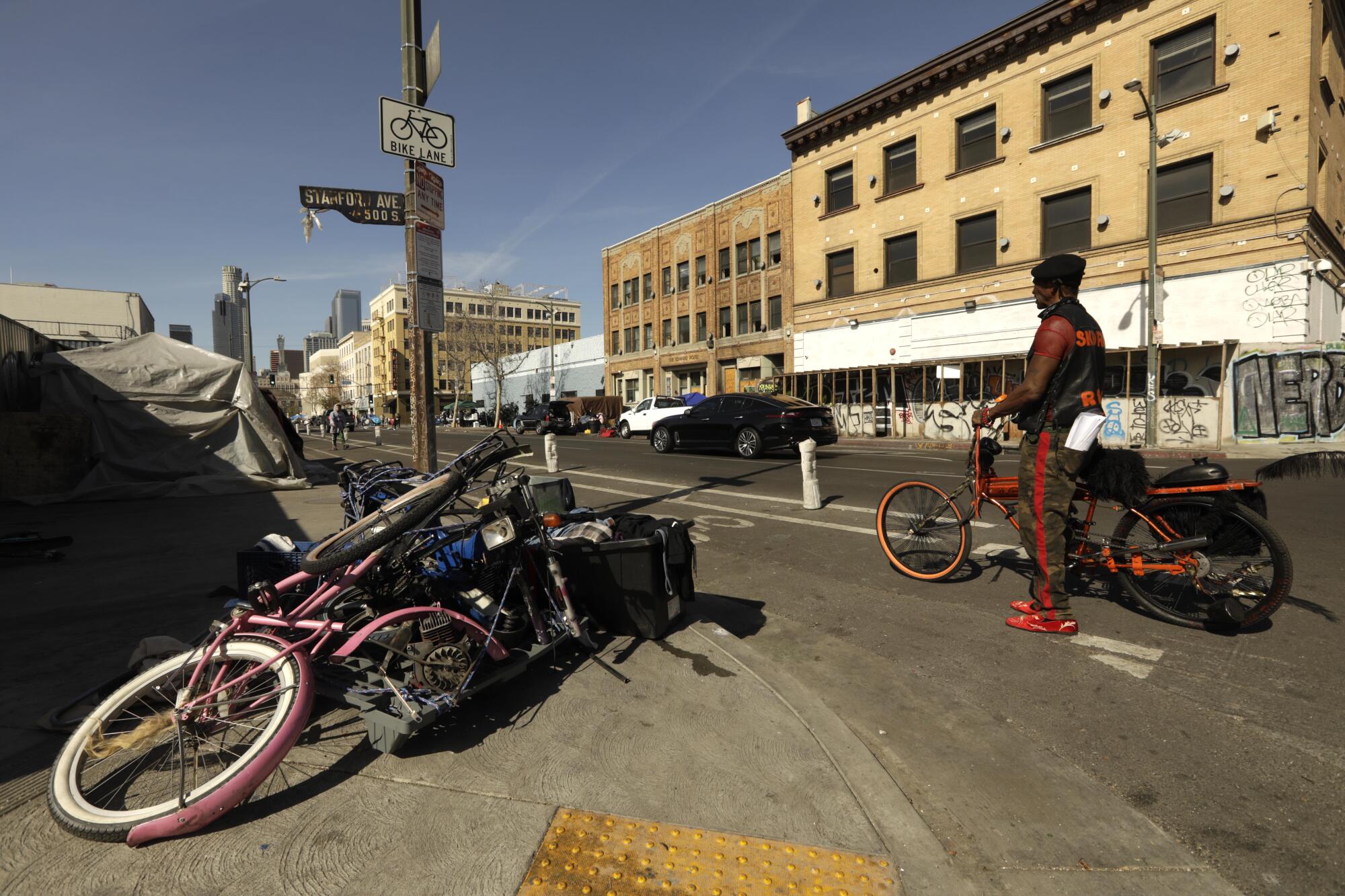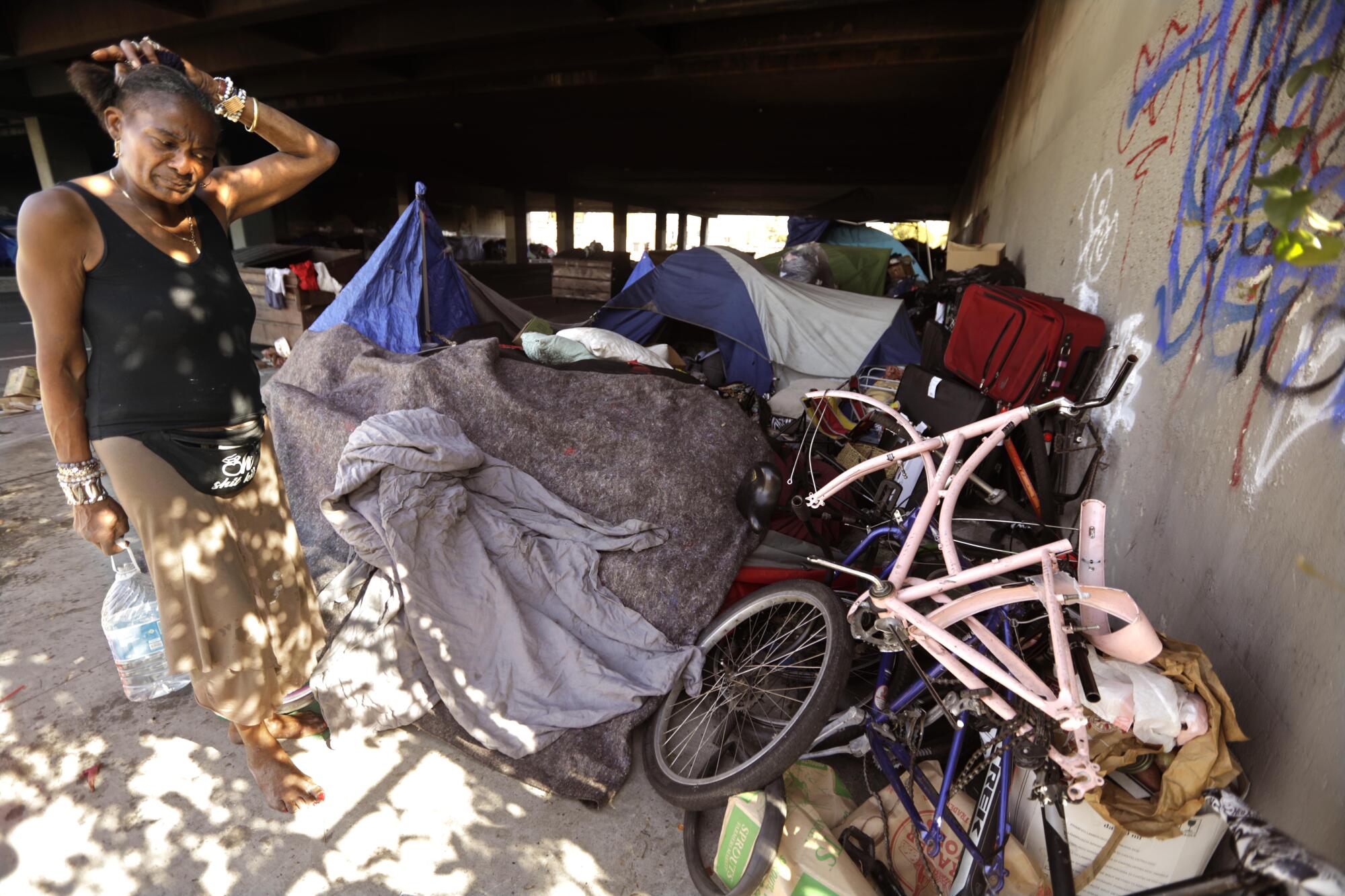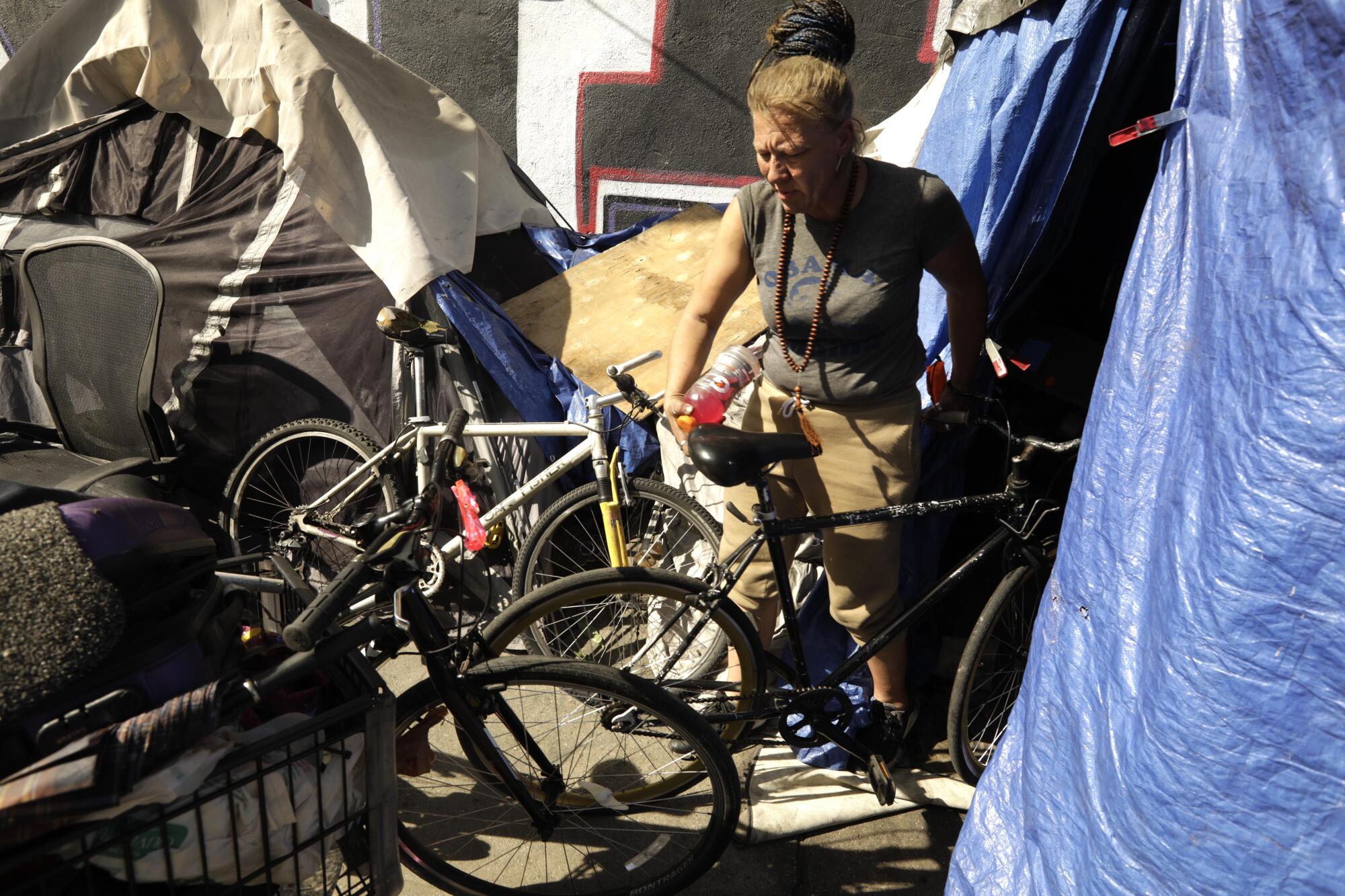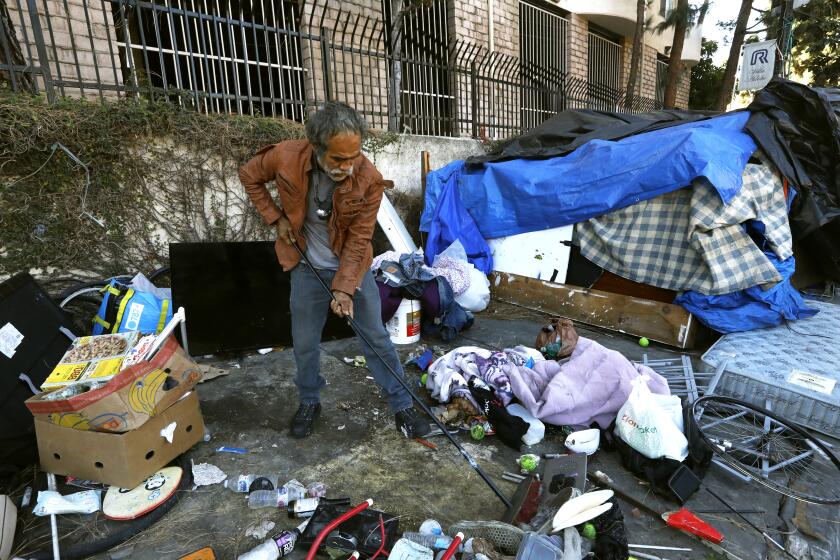
Large piles of wheelless bikes stacked alongside tents and lean-tos are a permanent fixture in many homeless encampments throughout Los Angeles.
Men and women fill their days tinkering, hoping to make some money or use the assembled or repaired bikes to get around.
For Denise Johnson, 58, who has been living under an overpass of the 405 Freeway for about a year, it’s an extra income stream. Her husband collects spare parts of bikes that they put together and sell.
That practice could be threatened after the Los Angeles City Council voted 10-4 on Tuesday to ask City Atty. Mike Feuer to draft a law prohibiting bikes from being repaired or sold on streets or sidewalks.

“For them to make a law against selling bikes, it’s no different than selling furniture or anything else,” Johnson said, pointing to a wheelless pink frame that her husband is working on. “My husband finds these things.”
Councilman Joe Buscaino, who is running for mayor and has focused his campaign on public safety and addressing homeless encampments, introduced the motion in the fall targeting bicycle “chop shops.”
Get the lowdown on L.A. politics
Sign up for our L.A. City Hall newsletter to get weekly insights, scoops and analysis.
You may occasionally receive promotional content from the Los Angeles Times.
On Tuesday, he said that the city shouldn’t be sending the message that a right-of-way can be blocked, noting that large collections of bikes in homeless encampments have made it hard for people to walk the streets.
“I believe this ordinance will give our LAPD officers the necessary tool to reduce bicycle thefts and to help clean up our streets,” Buscaino said.
Several colleagues echoed this sentiment, while also acknowledging that it was hard to prove that the bikes in encampments were actually stolen.
Some council members also said that when Feuer’s office writes the ordinance, it should target locations where large numbers of bikes are present and it’s clear they’ve been stolen.
Los Angeles has undertaken a major shift in its approach to homelessness, one that puts a priority on clearing unsightly street encampments.
“We have a significant, organized, repeat, criminal problem of bike theft,” Councilman Paul Krekorian said during Tuesday’s council meeting. “It has to be addressed aggressively. This is not a one-off occasional person who is fixing their bike or borrowed a bike from a friend.”
The motion approved by the council does not spell out those limitations. It asks the city attorney to draft “an ordinance to prohibit the assembly, disassembly, sale, offer of sale, distribution of bicycles and bicycle parts on public property or within the public right-of-way, modeled after a similar ordinance in the City of Long Beach.”
Critics of the move noted that bicycle theft is already illegal and called it a thinly veiled attempt to criminalize people living in encampments.
Councilwoman Nithya Raman, who voted against the motion, pointed out that blocking the right-of-way is already illegal.
She said that bike thefts are a problem in the city but that this effort wouldn’t prevent them.
In Long Beach, she noted that it’s illegal to assemble two or more bikes that might be missing parts, and the only way to prove bike ownership is by producing video or photographic evidence, a bill of sale, a serial number or a bicycle registration.
“How many of us have those things for our bikes on hand all the time? I certainly don’t,” she said. “This ordinance to me feels like political theater ... because the problem this ordinance is trying to address is already illegal.”
Councilman Marqueece Harris-Dawson joined Raman, Mike Bonin and Curren Price in voting no. He said that if a law like this was on the books when he grew up, he could envision a scenario where he or his brother would’ve been targeted. He said he never had a new bike — so no receipt or serial number — and when his beater broke down, he’d go to the park or sit on the sidewalk and tinker with it.
“Once again, I think it’s nice to think about solutions to problems that would never face you,” Harris-Dawson said. “It’s very different when you have to think about the problems that will be created and the jeopardy that you will be put in by this policy if you’re someone who might be targeted.”
Across the city, encampments with large numbers of bikes have sprung up in recent years. Some frustrated residents say these bikes are often stolen and then re-sold. Los Angeles averages about 2,000 to 2,500 reported bike thefts per year, according to a Times analysis of crime data.

The Los Angeles Police Department does not have a unit dedicated to bike theft, and over the past several years, 96% of bike thefts have gone unsolved, according to a Times analysis of crime data. Half of bike thefts are reported in two South L.A. and two Westside police divisions.
Police Chief Michel Moore said he thinks that many people don’t report stolen bikes, though he didn’t offer specifics beyond saying it’s something he’s heard from residents.
“The proliferation of ‘bicycle chop-shops’ occupying city sidewalks has created issues of safety and concern,” Moore said in a written statement to The Times, and “contributes to the underground market for stolen bicycles, adds to a sense of disorder and is not an essential element in providing shelter for houseless individuals.”
A spokesman for the department told The Times last year that bike owners often don’t have serial numbers, “so it makes it difficult to get the bike back.”
The Venice Neighborhood Council, the Del Rey Neighborhood Council and the Mar Vista community council were among the groups supporting the motion.
In a letter to the City Council, Matt Wersinger, chair of the Westside Regional Alliance of Councils, said this move is one of several “common sense actions that can help keep our neighborhoods clean and safe and will allow neighbors to support more earnestly the long-term solutions we all agree are needed.”
Pete White, executive director of the Los Angeles Community Action Network, said the proposed ban is another step in the city’s march toward clearing visible signs of homelessness without addressing the root causes or supporting people in crisis.
“The proposed ‘bike ban’ is more of the same: a facial attempt to declutter ‘targeted sidewalks,’ but whose real goal is to remove and banish houseless people from their community,” White said. “This proposed policy opens the door for increased policing, profiling, and discriminatory enforcement.”
Times staff writers Genaro Molina, Doug Smith and Kevin Rector contributed to this report.
More to Read
Sign up for Essential California
The most important California stories and recommendations in your inbox every morning.
You may occasionally receive promotional content from the Los Angeles Times.









